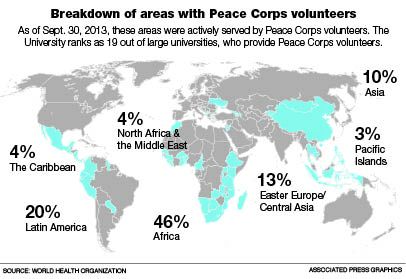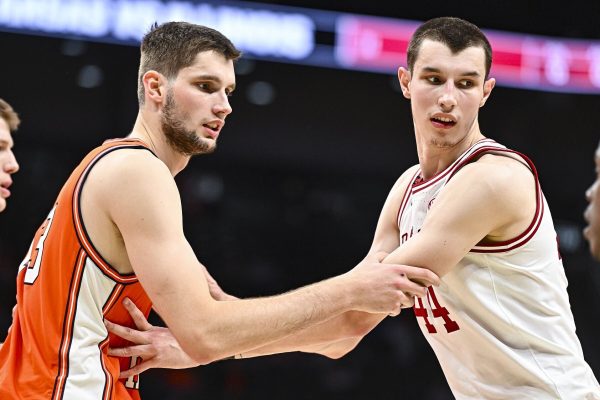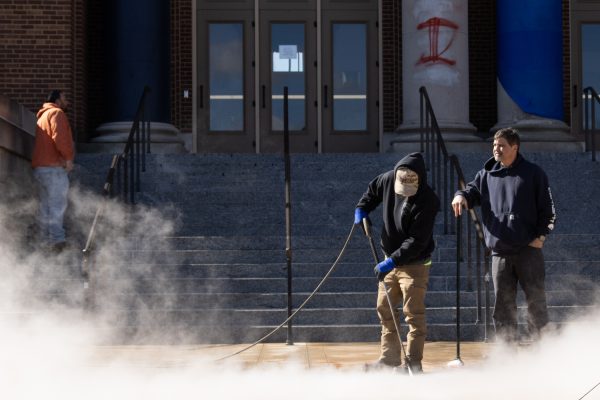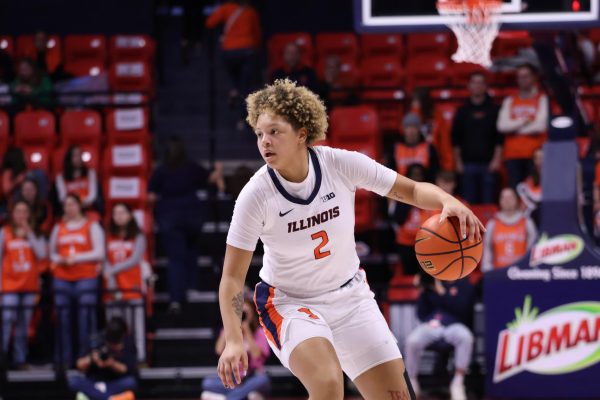University rises in Peace Corps ranking

February 19, 2014
After graduating from the University in 2010, Manuel Colon took his degree in Natural Resources and Environmental Sciences to Paraguay to serve in the Peace Corps until 2012.
Colon is among 1,988 University graduates who have served in the Peace Corps since the organization’s creation in 1961. This year the University was ranked No. 19 out of “large” universities, moving up four spots from last year, according to a press release.
Peace Corps volunteers come from all fields of study, but many volunteers serve in positions related to health care, education, agriculture and youth and community development, said Jessica Mayle, Peace Corps Midwest region public affairs coordinator.
“At a school like UIUC, we look at applicants in all colleges and all majors. They all have something to bring and they all have different experiences,” Mayle said.
Colon was a volunteer who worked as an environmental education volunteer in his town station. He was assigned to help the community develop ecotourism surrounding the lake and other features.
Get The Daily Illini in your inbox!
“Understanding that if we offer boat tours and have guides, you’re diversifying the economic importance of these places,” Colon said.
Beyond the economic aspect of Colon’s project, he worked to transfer knowledge to the town’s inhabitants in a variety of ways, such as explaining why aspects of the environment are important to the surrounding community.
Transferring knowledge is important even before service begins, said Alissa Harvey, campus Peace Corps representative.
During the application process, work and volunteer experience is taken into consideration along with hours spent “transferring knowledge,” or teaching others.
“A lot of what Peace Corps does is really transferring skills and knowledge,” Harvey said. “You’re also having skills and knowledge transferred to you. … You are going to facilitate knowledge, do training and teaching — so we are really looking at how many hours you’ve done that.”
Nicole Bridges is a University alumna who volunteered from 2006 to 2008 in Zambia in Southern Africa. She used her degree in Agricultural Communications to help address food security in her assigned town.
“I know my degree impacted what got me into Peace Corps,” Bridges said. “The program I was in was really specialized and having a degree in Agricultural Communications was something I was told that was one of the reason I was accepted to the Peace Corps in the first place.”
Coming out of the Peace Corps, volunteers also learn new personal and professional skills, such as leadership and project development, when they return to the United States, Harvey said.
“Where I was is extremely remote and you are really on your own, relying on yourself,” Bridges said. “You had to rise above and face those challenges that you’ve really never experienced before in the states.”
Bridges now runs the nonprofit group Prosperity Gardens in Champaign, which works with local urban agriculture.
“My experience there certainly has prepared me for my career as an executive director and being able to have the vision to tap into my community, assess the needs and being able to create opportunities for people here to grow so it’s absolutely responsible for preparing me and propelling me into this nonprofit career,” Bridges said.
Peace Corps volunteers come from all age ranges, but the median age of 28 indicates young people’s attraction to the opportunity.
“People who are fresh out of college with a degree, they have that motivation to help the world and to make a difference.” Mayle said. “They are smart and skilled and equipped, and they have everything we need of them to have a great volunteer.”
Miranda can be reached at mwhollo2@dailyillini.com.





